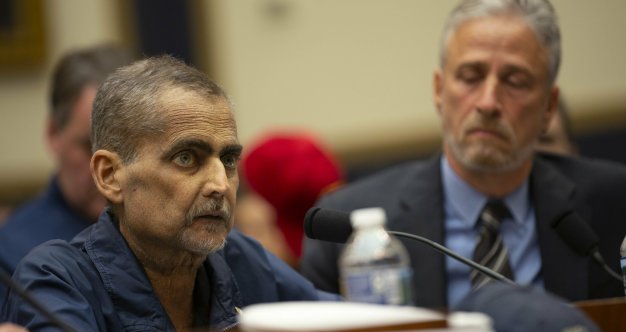Luis "Lou" Alvarez, the venerated retired New York City Police Department detective who served as a first responder after the September 11 attacks on the World Trade Center in 2001, died yesterday of colorectal and liver cancer.
He was 53 years old, and the cancer that took his life was linked to the heavy carcinogens in the air at Ground Zero, where Alvarez served for months after the attacks.
Read MoreDuring the hearing, Alvarez looked tired but determined as he sat next to Jon Stewart, former “The Daily Show” host and advocate for 9/11 survivors, and urged Congress to pass a bill permanently helping to fund medical costs for the sick. Alvarez shared with the lawmakers before him that he was scheduled to go in for his 69th round of chemotherapy to treat his 9/11-linked cancer the following day.
"I should not be here with you, but you made me come," Alvarez said. "You made me come because I will not stand by and watch as my friends with cancer from 9/11, like me, are valued less than anyone else."
RELATED: 9/11 CancersNew Warning Says 300,000 People at Risk Are Not Getting Help They Need
The day after the hearing, however, Alvarez's condition worsened. He felt too disoriented to continue chemotherapy and instead entered hospice care, according to a Facebook post that Alvarez shared on June 19.
"I will continue to fight until the Good Lord decides it's time," he wrote. That time was yesterday morning, Saturday, June 29.
"We told him at the end that he had won this battle by the many lives he had touched by sharing his three-year battle," Alvarez's family said in a statement. "He was at peace with that, surrounded by family."
9/11-Linked Cancer
In the days, weeks, and months following the 9/11 attacks, at least 400,000 people were exposed to hazardous fumes and particles such as asbestos, lead, and benzene, putting them at serious risk for long-term health effectsincluding cancer.
But a week after the attacks, the Environmental Protection Agency (EPA) told residents the air was safe in Lower Manhattan. With every cancer diagnosis, thoughand now with Alvarez’s deathit becomes increasingly clear that this wasn't the case.
"The vast majority of the victims of 9/11 didn't die the day of the towers going down," Dr. Gaetane Michaud, Chief of Interventional Pulmonary Medicine at NYU Perlmutter Cancer Center told SurvivorNet back in September. "There are a lot of people out there who either have died or are going to die from those fumes, from those dusts."
Tens of thousands of 9/11 first responders and survivors have already been diagnosed with cancer, and of those exposed, an estimated 300,000 people aren't accessing the government assistance they need for cancer screenings, treatment, and care.
RELATED: He Was a 9/11 Rescue Worker, He Got Cancer, And He Wouldn't Change a Thing
And now the Victim Compensation Fund (VCF) that was established to cover 9/11-related health costs for those affected is running out of money. During the congressional hearing on June 11, Alvarez, Stewart, and many 9/11 first responders and survivorsmany of them illcalled on Congress to step it up and pass legislation to reenact the VCF permanently.
Alvarez' death has brought further urgency to the situation, and lawmakers have responded with support for the bill.
Representative Peter King (R-N.Y.), one of the cosponsors of the bill, wrote on Twitter yesterday that Congress "cannot allow Lou Alvarez to have died in vain.”
Congress must honor the memory of Lou Alvarez and pass the Victims Compensation Fund without delay. Cannot allow Lou Alvarez to have died in vain. Det. Luis Alvarez R.I.P. pic.twitter.com/QFAopxFUHx
Rep. Pete King (@RepPeteKing) June 29, 2019
SurvivorNet previously spoke with John Feal, 9/11 first responder and founder and president of the Feal Good Foundation, which helps those get the healthcare and cancer screenings they need (which would be the same goal as the legislation those attending the hearing called for).
"I look over my shoulder every day wondering, when do I get 9/11 cancer? There's now over 90,000 people in the World Trade Center Health Program that were affected by 9/11," Feal said. "Over 40,000 of them are being treated for more than two illnesses. This is real. This is not made up. This is staggering."
RELATED: Helpful Resources if You're Worried About 9/11-Linked Cancer
After being diagnosed with 9/11-linked cancer, Alvarez joined Feal in advocating for 9/11 survivors' compensation.
Alvarez and Feal had become close friends, and in a statement to the Washington Post after Alvarez' death yesterday, Feal said, "This one makes my heart bleed. This one's bruised my soul, and this one is going to be hard to recover from. I miss my dear friend. Anyone who knew him should want to embrace and emulate the way he lived. He gave of himself on 9/11 and the way he lived his life until the very end. Maybe the Congress and the Senate can learn a thing from his passing."
Learn more about SurvivorNet's rigorous medical review process.


